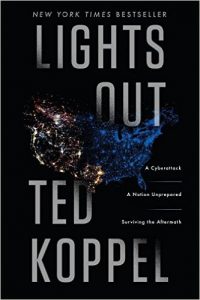 “Lights Out” is an introductory work to the topic of US electrical grid vulnerability. It covers, in a brief and somewhat padded manner, the frailty of the grid; the confused and inept preparation of the government; and what some normal citizens themselves are doing in preparation for a temporary, but large-scale and possibly lengthy, failure of the grid.
“Lights Out” is an introductory work to the topic of US electrical grid vulnerability. It covers, in a brief and somewhat padded manner, the frailty of the grid; the confused and inept preparation of the government; and what some normal citizens themselves are doing in preparation for a temporary, but large-scale and possibly lengthy, failure of the grid.
All of this information is common knowledge to anyone who has been paying any attention to the topic, or to any similar disaster preparedness topic, which topics have been in the forefront of popular culture for nearly ten years. Reading a few New York Times, Atlantic and other articles will easily give you the sum total of information in this book, with one exception I discuss below. That doesn’t mean it’s a bad book, but it does mean that the breathless way in which the author, Ted Koppel, suggests he is revealing new information is overblown. But for people who haven’t been paying any attention to the topic, it’s a good, if superficial, treatment of the potential problems and possible responses by individual citizens.
Koppel collects enough opinions from government officials, many contradictory, to tease out that such officials have two basic responses, assuming they have any response at all to his questions about grid failure. One is “we’ll muddle through it.” The other is “we’ll just send everyone from the cities to someplace else where they can be fed and housed.” This latter is, of course, incredibly disturbing to people not in large cities, feeding various paranoias, and Koppel covers the reaction of some such people. The reality is, though, that in a large-scale grid collapse the government would be totally useless for anything, just like it was in Hurricane Katrina, and the idea that the government could somehow evacuate New York City to New Jersey, much less to, say, rural Pennsylvania, is sheer fantasy.
The one topic the book does cover, at length, is something that I’ve often wondered about. The Mormon church is well known for requiring preparedness for disasters by its members, and for being extremely organized about issuing specific instructions along these lines. But given the Church’s own history of being violently persecuted, it seems logical that the Mormons would not just require the storage of food and essentials for its members, but also the means for keeping its members and their stores safe, namely weapons. Yet this is apparently not the case—no instructions on weapons are given by the Mormons, other than that members may want to consider firearms, and firearms are not forbidden. (I once asked a Mormon acquaintance if they maintained arsenals at temples, given their history. He said no.) It appears, from Koppel’s discussion and interviews of Mormon leaders, that this ambiguity is entirely intentional—it allows Mormons to choose the (solely) Christian virtue of turning the other cheek if they want, or to choose active defense. It’s what Koppel calls “constructive ambiguity,” analogizing it to Henry Kissinger’s negotiating technique. Seems like a reasonable explanation, and the first I’ve ever seen in print. (However, it does seem to prevent Mormons acting in organized concert in defense, which would be infinitely more valuable to the Church under certain circumstances than some Mormons individually having some weapons.)
So as a starting place on the topic, if you’re concerned about disaster preparedness, this book is pretty good. If you’ve already thought about the topic, though, it’s not going to add much, if anything, to what you already know.
